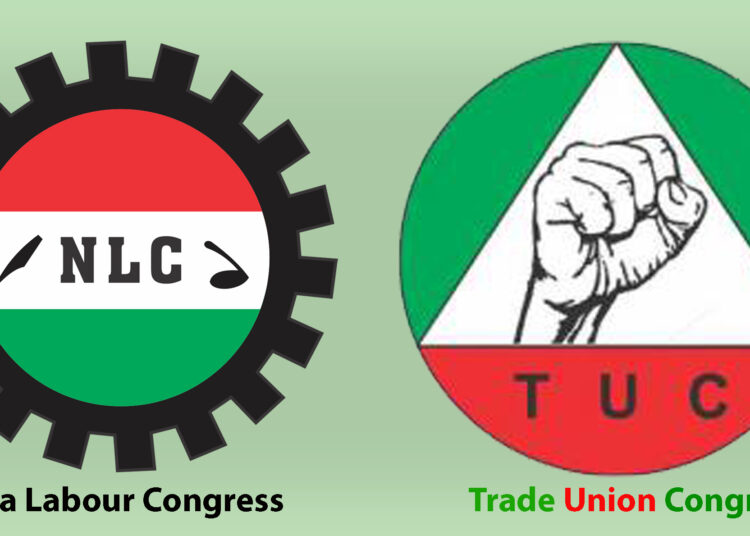Senate President Godswill Akpabio has come under fire from the Organised Labour – Nigeria Labour Congress (NLC), Trade Union Congress (TUC), and the Nigeria Employers’ Consultative Association (NECA) – over his recent remarks on tax evasion in Nigeria.
Akpabio, speaking at a public hearing on the Tax Reform Bills before the Senate on Monday, claimed that only 30 per cent of Nigerians pay tax, yet citizens demand extensive infrastructure, security, and other government services.
Akpabio’s comment has sparked swift reactions from labour unions and economic stakeholders, who argued that government unaccountability and poor service delivery were key reasons many Nigerians avoid tax payments.
Deputy President of TUC, Dr. Tommy Okon, dismissed Akpabio’s claims, questioning the credibility of his statistics.
“We do not know where he got his facts from in a country where there is a dearth of data. If what he is saying is true, how come the Federal Inland Revenue Service (FIRS) always surpasses its set target?” Okon asked.
He further argued that workers do not evade taxes, as their payments are deducted directly from their salaries, unlike the wealthy elite who often exploit loopholes to avoid taxation.
“This government has taxed the masses enough, and it is even the wealthy few that evade payment of tax, not the workers whose taxes are deducted from source,” he added.
NECA also weighed in, blaming the government for failing to justify tax payments with tangible benefits.
NECA’s Director-General, Adewale-Smatt Oyerinde, acknowledged that tax compliance in Nigeria was low but insisted that government inefficiency was a major factor.
“It is not far from the truth that the majority of Nigerians don’t pay tax. While this is quite unfortunate, the government too has been culpable in giving the citizens many reasons not to pay, especially as the benefits of the taxes collected are not seen by many,” Oyerinde stated.
He emphasised that while tax reforms were necessary, there must also be accountability in revenue utilisation to regain public trust.
LEADERSHIP reports that the debate over tax compliance took center stage at the public hearing on the Tax Reform Bills, which were forwarded to the Senate and House of Representatives by President Bola Tinubu on October 3, 2024.
The bills under consideration include the Nigeria Tax Bill (NTB) 2024, the Nigeria Tax Administration Bill (NTAB) 2024, the Nigeria Revenue Service (Establishment) Bill (NRSEB) 2024, and the Joint Revenue Board (Establishment) Bill (JRBEB) 2024
According to Senator Sani Musa, Chairman of the Senate Committee on Finance, President Tinubu has urged lawmakers to provide “workable laws” that will drive fiscal reforms and economic growth.
“I met President Bola Ahmed Tinubu two days ago on the tax reform bills, and he told me, ‘Go and do the needful. Give me a law that is workable from the tax reform bills I forwarded to the Senate and the House of Representatives,'” Musa revealed.
Declaring the public hearing open, Senate President Akpabio reiterated the importance of tax compliance, noting that many Nigerians expect government services without contributing their share.
“I don’t think up to 30 per cent of Nigerians pay taxes, but 100 per cent of Nigerians want good roads,” he stated.
Akpabio stressed that the proposed tax reforms aimed to modernise outdated tax laws, some of which date back to colonial times. He also highlighted the unequal distribution of tax revenue, particularly in cases where businesses operate in one state but remit taxes to another.
“If a brewery operates in Ogun State but its headquarters is in Lagos, the tax revenue is collected in Lagos, while Ogun, the state that hosts the factory, sees little benefit. This imbalance must be addressed,” he said.
The Senate President also criticised social media misinformation about the bills, urging Nigerians to engage with the legislative process instead of relying on online debates.
“Don’t base your arguments on social media opinions. Read the bills, analyse them, and present well-informed recommendations,” he said.
Despite labour unions’ criticisms, several economic bodies and stakeholders expressed support for the proposed tax reforms.
The Nigerian National Petroleum Company Limited (NNPCL), Revenue Mobilisation and Fiscal Allocation Commission (RMFAC), National Association of Chambers of Commerce, Industry, Mines and Agriculture (NACCIMA), and the Institute of Chartered Accountants of Nigeria (ICAN) all backed the bills, citing their potential to enhance economic stability and revenue generation.
Group Chief Executive Officer of NNPCL, Mele Kyari, described the bills as a game-changer for the oil and gas sector.
“We are the happiest people to see this tax law coming into place. It brings a significant number of reforms that will simplify the tax system and tax laws in our country,” Kyari said.
Similarly, chairman of the Revenue Mobilsation Allocation and Fiscal Commission (RMFAC), Dr. Mohammed Shehu, said the bills would enhance economic stability, while urging lawmakers to ensure fair revenue distribution among sub-nationals.





